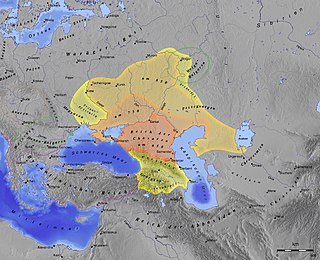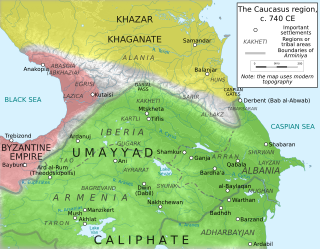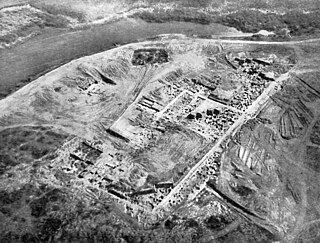
The Khazars were a semi-nomadic Turkic people with a confederation of Turkic-speaking tribes that in the late 6th century CE established a major commercial empire covering the southeastern section of modern European Russia. The Khazars created what for its duration was the most powerful polity to emerge from the break-up of the Western Turkic Khaganate. Astride a major artery of commerce between Eastern Europe and Southwestern Asia, Khazaria became one of the foremost trading emporia of the medieval world, commanding the western marches of the Silk Road and playing a key commercial role as a crossroad between China, the Middle East and Kievan Rus'. For some three centuries the Khazars dominated the vast area extending from the Volga-Don steppes to the eastern Crimea and the northern Caucasus.
Atil, literally meaning "Big River", was the capital of Khazaria from the middle of the 8th century until the end of the 10th century. The word is also a Turkic name for the Volga River.
Grand Prince of Kiev was the title of the Kievan prince and the ruler of Kievan Rus' from the 10th to 13th centuries. In the 13th century, Kiev became an appanage principality first of the Grand Prince of Volodymyr and the Golden Horde governors, and later was taken over by the Grand Duchy of Lithuania.
Seljuk Beig was an Oghuz Turkic warlord, eponymous founder of the Seljuk dynasty.
Bulan was a Khazar king who led the conversion of the Khazars to Judaism. His name means "elk" or "hart" in Old Turkic. In modern Turkish, it means The one who finds. The date of his reign is unknown, as the date of the conversion is hotly disputed, though it is certain that Bulan reigned some time between the mid-8th and the mid-9th centuries. Nor is it settled whether Bulan was the Bek or the Khagan of the Khazars.
Khazar, also known as Khazaric or Khazaris, was the dialect spoken by the Khazars, a group of semi-nomadic Turkic peoples originating from Central Asia. There are few written records of the language, and it is regarded as extinct. Khazar was a Turkic language; however, there is a dispute among scholars as to which branch of the Turkic language family it belongs. One consideration believes it belongs to the Oghur ("lir") branch of the Turkic language family, while another consideration is that it belongs to the Common Turkic branch.
Arsiyah was the name used for a group of Muslim mercenaries in the service of the Khazar Khaganate. Whether the Arsiyah were a single tribe or composed of Muslims from a number of different tribes is unclear. Also unclear is their origin; many historians regard them as deriving from Khwarazm, but some scholars point to the fact that "As" is the Turkic term for Alans and believe that the Arsiyah were Alanic in origin. Other scholars derive the name from Iranian Auruša (white).
Khagan Bek is the title used by the bek (generalissimo) of the Khazars.
Elteber was the client king of an autonomous but tributary tribe or polity in the hierarchy of the Turkic khaganates and Khazar Khaganate.
The Battle of Marj Ardabil or the Battle of Ardabil was a battle fought on the plains surrounding the city of Ardabil in northwestern Iran in 730. A Khazar army led by Barjik, the son of the Khazar khagan, invaded the Umayyad provinces of Jibal and Adharybaydjian in retaliation for Caliphate attacks on Khazaria during the course of the decades-long Khazar-Arab War of the early 8th century.
The Battle of Balanjar was fought around 732 near the Khazar city of Balanjar. The Umayyad army, commanded by the prince Maslamah ibn Abd al-Malik, was victorious and advanced on towards Samandar.

The Arab–Khazar wars were a series of conflicts fought between the armies of the Khazar Khaganate and the Rashidun, Umayyad, and Abbasid caliphates and their respective vassals. Historians usually distinguish two major periods of conflict, the First Arab–Khazar War and Second Arab–Khazar War, but the Arab–Khazar military confrontation also involved sporadic raids and isolated clashes from the middle of the 7th century to the end of the 8th century.
Golden Hills is an archaeological site in southern Russia. It is located in the region of the lower Don River, on the Aksay River about 70 km (43 mi) east of Rostov-on-Don.
Pax Khazarica is a historiographical term, modeled after the original phrase Pax Romana, applied to the period during which the Khazar Khaganate dominated the Pontic steppe and the Caucasus Mountains. During this period, Khazar dominion over vital trans-Eurasian trade routes facilitated travel and trade between Europe and Asia by such groups as the Radhanites and the early Rus. The originator of the term is unknown but it was in use by scholars as early as the nineteenth century.
Tong Yabghu Qaghan was khagan of the Western Turkic Khaganate from 618 to 628 AD. His name is usually translated as "Tiger Yabgu" in Old Turkic. Another interpretation of his name is "sufficiency" or "completeness".
Ishad was an Old Turkic word used to designate the highest-ranking Göktürk generals. It is also used in some Arabic sources to describe the Khagan Bek of the Khazars.

Khumarinskoye gorodishche or Khumar is a ruined medieval fortress on the top of Mount Kalezh above the Kuban Gorge in the Greater Caucasus, near Khumara village, Karachaevsky district, Karachay–Cherkessia, Russia.
The Rus' Khaganate is the name applied by some modern historians to a hypothetical polity postulated to exist during a poorly documented period in the history of Eastern Europe, roughly the late 8th and early-to-mid-9th centuries AD.






